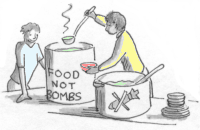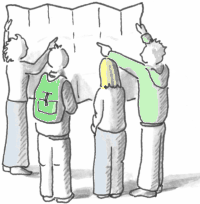An affinity group is a small group of people who come together to prepare for and take direct action. They make decisions together, and support each other during and after action. Sometimes these groups are formed just for one action, but often they are ongoing groups that organise and take part in actions over a number of years.
The ‘affinity’ between people in the group is something that they have in common. In general, people in an affinity group will be focused on taking action on the same issues, and share aims and tactics. Some affinity groups may also be structured around something else you have in common, such as living in the same place, or sharing a particular skill (e.g. action medics).
Affinity groups are often organised along the principles of non-hierarchy and autonomy. This means that decisions are made directly within the group by all its members, and responsibility and power is shared so that everyone has an equal voice.
The idea of affinity groups is that everyone participates equally in making decisions and taking action together. This is not just an effective way of making sure people feel committed to the actions you’re taking, it’s also putting the values of equality and direct democracy into practice.
All important decisions are made within the group even if you are participating with others in a larger action. By working closely with a small group of people you can work out what's important for you, and then go out and make it happen. Your affinity group may be part of wider campaigns and networks, but you often only need to depend on yourselves throughout an action. This is especially the case if you work at building up skills within your affinity group, so you can cover the needs of everyone in your group.
Affinity groups are able to make good use of resources. 10 groups of 10 people taking direct action can often achieve more than 100 people acting on mass. Because affinity groups can make decisions autonomously, they can react quickly and creatively if the situation changes. This also provides an element of uncertainty for the authorities. Many actions can be pulled off effectively with just a few people.
Having a group of people looking out for one another throughout actions or during a long and tiring campaign is an effective way to make sure everyone is cared for. Stress, fear, police repression and campaign setbacks are all dealt with more easily as part of a group than on your own. Sharing needs and paying careful attention to each other’s well-being before, during and after actions also helps the group be more sustainable and long lasting.

Planning actions in small groups makes it much more likely they will happen without your action target or the police finding out about it first. Big planning meetings are much less secure than plans made with a small trusted group. Working in affinity groups also helps limit the damage if a movement has been infiltrated by undercover police or industry agents.
Finding friends to hang out with is one thing, finding friends to take action with is another! The ideal situation may be to have people you like, who live locally, who have a similar amount of time to take action on the same issues using the same tactics. However, even if your situation isn't this perfect, this doesn't need to stop you from doing anything at all.
Organising and participating in events can be a good way of finding people who feel strongly enough to take action on your issue. This could be a meeting, or something more informal like a film night with opportunities for chatting afterwards. Alternatively, look for people from your area who have turned up to regional or national events, and arrange to meet up afterwards.
It’s important that people in an affinity group have enough in common to take action together. Working out how much common ground you have in terms of your aims and tactics will give your group clarity of purpose and help avoid conflict later on. For example, you might discuss:
If you are considering forming a long term group, think about how much common ground you have around these questions. Do you have just enough in common to work together on one action? Might you work together occasionally over a long period? Or have you found a group of people you can stick to through thick and thin? This is likely to change over time – you may well want to start by doing a few lower risk actions together, and then work more closely together if things go well.
Affinity groups are based on mutual support and trust which takes some work to build. Whether you are building a long-term group, or are an ad hoc affinity group that has come together just for one action, take some time to get to know each other. Share your experiences, worries and motivations. Knowing each other better will make it possible to give each other the right kind of support in stressful situations. It doesn’t need to too formal either – you could go for a bike ride, have a meal together, or go to the pub. Even if you’re meeting just before an action, having a quick chat about your hopes and needs beforehand can make a big difference.
Whether you are coming together for just one action or building a long term affinity group, you’ll need to spend time together working out how the group will operate. Your agreement could include:
Make sure you not only think about the planning phase of actions but also consider what happens during and after actions.
For an affinity group to work well, it’s important that your agreement takes into account everyone’s core needs – so that hopefully everyone is willing and able to stick to it, even in stressful situations. If people sign up to something that goes against their needs or core beliefs, they may not stick to it - undermining trust within the group and potentially putting themselves or others at risk.

Ideally all members of an affinity group should be involved in the action planning process.
Start with your aims, and then choose your targets (people or organisations you will put pressure on) and tactics (the specific activities you will do). This often involves doing some research. Consider what kind of pressure your action will put on your target – for example, economic damage, delay, or bad publicity. For a long term group, this might be part of a campaign strategy (see our Campaign strategy guide for more).
Alternatively, some affinity groups may be designed to intervene quickly in events that come up, for example resisting home evictions or immigration raids. For these kinds of actions you can make agreements for a general process that you will use each time.
Make as thorough a plan as possible for how you will time and carry out your action. Work out any roles people will take on, such as a driver, legal observer, police liaison, media spokesperson or arrestee support. Many of these decisions will depend on the skills people have, their preferences in the action and whether they are able to risk arrest. Ensure everyone is comfortable with their role, and support them to prepare in whatever way helps them feel more confident.
Think through what might happen on the action and how the group will respond to those situations. For example:
When affinity groups work well, members of the group tend to have a high level of trust in each other, and a good understanding of each other’s needs. This means that you can rely on each other to provide support and keep to the agreements you made. Remember to keep checking in that everyone is OK.
Even within affinity groups there are extra support systems you can use. Buddying up is one, and is particularly useful for larger affinity groups. It means agreeing in small groups (generally 2–4) to look out for each other’s well being. Buddies should be prepared to:
Often during an action you will need to make quick decisions in a changing situation. If the police are threatening arrest at any moment, or you may have spied an opportunity that you need to take quickly or miss altogether, you may only have seconds to decide what to do. Our Quick consensus decision making guide gives a useful process for making decisions in fast moving situations, actions and protests.
Debriefing after an action gives you a chance to regroup, check how it has affected people and evaluate how the action went. Even if you are only taking action together once, or don’t have much time, try to have at least half an hour as soon as possible after the action. Agreeing a debrief time and location before the action helps to ensure it happens.
Having some structure to the debrief can help ensure everyone’s voice is heard. You could for example make use of go-rounds and chats in pairs. Topics to cover could include:
Debriefs are an opportunity to celebrate what you achieved. At the same time be ready to support people to process difficult or traumatic events such interactions with the opponent, police violence or arrest. Be aware that different people may have experienced the action in very different ways and make space for everyone to share what went on for them.
Be realistic about how much you take on and give yourselves time between actions to rest. Organise social time together to help you stay connected in the down time between actions. Pacing yourselves can also help you be more strategic – gradually escalating your actions can make a bigger impact on a target.
Sharing and improving skills within your group can help make you more effective, increase your autonomy, and prevent informal hierarchies developing if some people have more experience than others. Tasks like facilitating meetings or researching targets for an action can be rotated so that everyone gains confidence in these skills.

It can sometimes be difficult for groups to stay inspired and energised, especially if you experience setbacks, traumatic events, or a pattern of overworking. Watch out for signs that people are suffering from burnout. This can include emotional and physical fatigue, lingering illnesses, or feeling disempowered, hopeless and angry. If you are worried about someone, be ready to ease their workload even if it means you get less done as a group. Where possible try to make sure that people can take time away without losing their social network at the same time, by having social time that is not connected to meetings or actions, for instance.
You might find the following resources helpful:/p>
The Activist Trauma Support website is now dormant but has many useful resources.
Counselling for Social Change provide free/low cost counselling for activists and campaigners.
Some groups struggle with the issue of attracting new members and making them feel included whilst not 'watering down' the original ethos of the group. If the ethos and methods of working aren't clear to new members from the start it can lead to problems later. You might also decide to have a closed affinity group, i.e. you have enough people to do what you want, and therefore don’t invite anyone else to join you.
Be explicit from the start about the group’s core aims and agreements, take the time to explain these to any new members and ensure there is opportunity for discussion and collective understanding around difficult issues. At the same time create space for new members to actively shape the group to help them feel committed and motivated.
All groups are affected by power dynamics in society, meaning some members of the group are more likely to have a voice in meetings, lead decision making, or have their needs met. Dynamics within the group can also lead to informal hierarchies, for example because particular people are seen as having more experience and skills, or have access to more information than others. Problems often arise when some people are seen as more committed, perhaps because they always turn up to meetings and actions. The creation of a 'core' of people who always turn up often leads to informal decision making outside of meetings, creating an unintentional hierarchy.
In meetings use good facilitation, with an emphasis on supporting everyone to participate (see tips in our Facilitation guide). Vary your meeting times so it isn't always the same people who can't go, and make sure that people who miss one meeting still get told about the next one! Even if someone has missed a meeting, there may still be ways for them to take on tasks in preparation for the action. Rotate jobs and roles and build in skill-sharing to your work to build up everyone's confidence and respect for each other.
Groups sometimes struggle to reach agreement on a decision. If these disagreements are about big questions like aims and tactics, it may simply be that the group doesn't have enough common ground to work together. Alternatively, it may be that less fundamental disagreements are blinding you to the common ground you do have. However your group operates, it’s important to have a clear decision making process so that everyone can participate and it is clear when there is a failure to reach agreement.
You may need to revisit important questions like the aims and principles you have in common, and the targets and tactics you agree on using. Remind yourselves of the things you have achieved by working together. Often disagreements may be resolved by taking a step back, sharing your underlying needs and concerns, and working together to reach a solution that fulfils everyone’s needs.
Joining a mass action as an affinity group can be a powerful and exciting experience. It can also pose the question of how to maintain your group's autonomy. It can be difficult to plan and act independently, especially if you are relying on overall organisers for information and infrastructure.
Organising or attending skill-shares can help you reach a point where the group is able to cover all its own needs for the whole action (group work skills, media skills, first aid skills, legal knowledge etc.) You may also choose to participate in mass actions that have scope for you to plan your own role. For instance, a mass blockade might involve several affinity groups taking on a different entrance or access road, deciding within their groups where and how they will form their blockade at a co-ordinated time. Alternatively, affinity groups might take responsibility for particular roles, such as legal support, first aid or providing food.